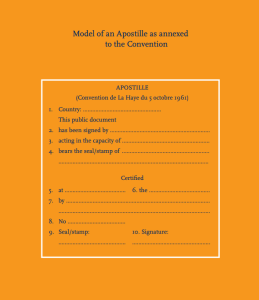On March 8, 2023, China submitted its instrument of accession to the Convention of 5 October 1961 Abolishing the Requirement of Legalisation for Foreign Public Documents, also known as Hague Apostille Convention. The Convention will come into force for China on Nov. 7, 2023. China’s Ministry of Foreign Affairs (MFA) has been designated as the Competent Authority in China’s mainland to issue Apostilles. China’s MFA also authorizes the Foreign Affairs Offices of provinces, autonomous regions and municipalities directly under the Central Government to issue Apostilles for documents that are issued within their respective administrative areas.
Hague Apostille Convention was made in the Hague, the Netherlands, by the Hague Conference on Private International Law (Hague Conference) in 1961. Since then, more than 120 countries have joined the Hague Apostille Convention. A list of the countries that are contracting parties to Hague Apostille Convention is available on the Hague Conference website.
The purpose of Hague Apostille Convention is to simplify the procedures by which public documents are certified for use abroad. It replaces the traditional legalization/authentication with a single certification known as “Apostille“. The traditional legalization process involves the authorities of the country where the document was issued as well as the Embassy or Consulate of the country where the document is to be used.
Hague Apostille Convention has its limitations. Only countries that are parties to the Convention can issue and accept Apostilles. For other countries, the traditional legalization with embassies and consulates remains in use. The scope of the Convention only covers court documents, administrative documents, notarial acts, and some official certificates. Specific examples are found in The ABCs of Apostilles which is the Hague Convention’s official brochure providing the basic information about Hague Apostille Convention. Also, an Apostille does not certify the content of the document. It only certifies the signature or seal of the person or authority who signed or sealed the document.
